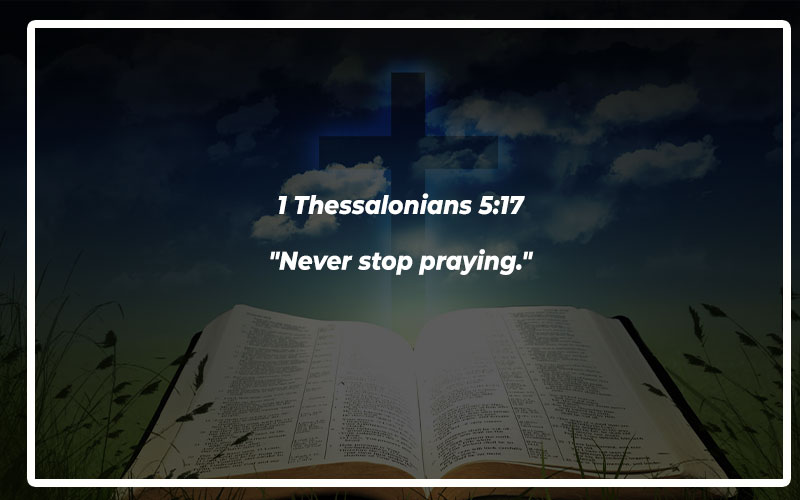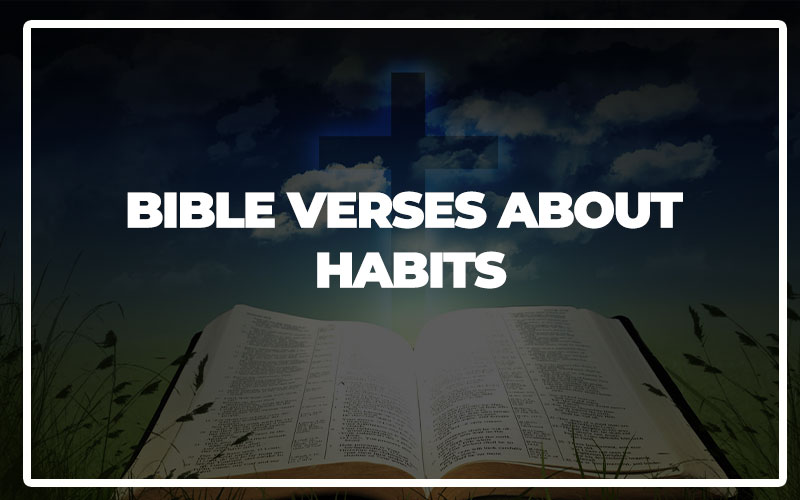Our habits play a significant role in shaping who we are. As Christians, the Bible guides us toward developing practices that honor God and help us grow spiritually. Below are seven key areas where the Bible offers wisdom about habits, paired with scripture to guide and encourage you.
Bible Verses About Night Prayers
Habit of Prayer
Prayer is one of the most important habits a believer can cultivate. It is the means by which we communicate with God, seeking His guidance, wisdom, and strength in all areas of life. Establishing a consistent prayer life nurtures our relationship with God and helps us stay aligned with His will.
1 Thessalonians 5:17
“Never stop praying.”

This verse emphasizes the importance of constant communion with God. Prayer isn’t just a scheduled activity; it’s a lifestyle that keeps us spiritually connected and reliant on Him.
Philippians 4:6
“Don’t worry about anything; instead, pray about everything. Tell God what you need, and thank Him for all He has done.”
Paul encourages believers to turn to prayer in times of anxiety, presenting their requests to God with thanksgiving. This habit fosters peace and trust in God’s provision.
Colossians 4:2
“Devote yourselves to prayer with an alert mind and a thankful heart.”
A disciplined prayer life requires both focus and gratitude, helping us stay spiritually awake and aware of God’s work in our lives.
Matthew 6:6
“But when you pray, go away by yourself, shut the door behind you, and pray to your Father in private. Then your Father, who sees everything, will reward you.”
Jesus teaches that prayer should be intimate and personal, not for public show. This habit of private prayer builds a deeper, more genuine relationship with God.
Mark 1:35
“Before daybreak the next morning, Jesus got up and went out to an isolated place to pray.”
Jesus’ habit of seeking solitude for prayer highlights the importance of dedicating intentional time to be alone with God, even amidst the demands of life.
Habit of Reading Scripture
Reading the Word of God is essential for spiritual growth. It nourishes our soul, provides guidance, and reveals God’s character. Developing a habit of daily Bible reading equips us to navigate life’s challenges with wisdom and discernment.
Psalm 119:105
“Your word is a lamp to guide my feet and a light for my path.”
God’s Word is a guiding light, illuminating our way through life’s uncertainties and helping us stay on His path of righteousness.
2 Timothy 3:16
“All Scripture is inspired by God and is useful to teach us what is true and to make us realize what is wrong in our lives. It corrects us when we are wrong and teaches us to do what is right.”
This verse affirms the transformative power of Scripture in shaping our character and aligning us with God’s truth.
Joshua 1:8
“Study this Book of Instruction continually. Meditate on it day and night so you will be sure to obey everything written in it. Only then will you prosper and succeed in all you do.”
God calls us to meditate on His Word consistently, allowing it to guide our decisions and actions for a successful and fulfilling life.
Hebrews 4:12
“For the word of God is alive and powerful. It is sharper than the sharpest two-edged sword, cutting between soul and spirit, between joint and marrow. It exposes our innermost thoughts and desires.”
The living nature of God’s Word pierces deep into our hearts, revealing areas in need of change and transformation.
Matthew 4:4
“But Jesus told him, ‘No! The Scriptures say, People do not live by bread alone, but by every word that comes from the mouth of God.'”
Jesus emphasizes the necessity of relying on God’s Word for spiritual sustenance, just as we rely on food for physical nourishment.
Habit of Serving Others
Serving others is a reflection of Christ’s love. Developing a habit of selfless service not only benefits others but also cultivates humility and compassion within us. The Bible encourages believers to be servants, putting the needs of others before their own.
Matthew 20:28
“For even the Son of Man came not to be served but to serve others and to give his life as a ransom for many.”
Jesus models servant leadership by laying down His life for humanity. As His followers, we are called to adopt the same selfless attitude in serving others.
Galatians 5:13
“For you have been called to live in freedom, my brothers and sisters. But don’t use your freedom to satisfy your sinful nature. Instead, use your freedom to serve one another in love.”
Christian freedom should lead to loving service, using our gifts and opportunities to care for others rather than indulging in selfish desires.
John 13:14-15
“And since I, your Lord and Teacher, have washed your feet, you ought to wash each other’s feet. I have given you an example to follow. Do as I have done to you.”
Jesus sets an example of humility by washing His disciples’ feet, illustrating that no act of service is beneath us in God’s Kingdom.
1 Peter 4:10
“God has given each of you a gift from His great variety of spiritual gifts. Use them well to serve one another.”
God equips us with unique talents and abilities to serve others, encouraging us to make the most of our gifts to bless the body of Christ.
Romans 12:10
“Love each other with genuine affection, and take delight in honoring each other.”
Serving others starts with genuine love and respect, placing others’ needs above our own and seeking ways to honor them through our actions.
Habit of Generosity
Generosity is a reflection of God’s abundant grace toward us. When we develop the habit of giving, we demonstrate trust in God’s provision and participate in His work of blessing others. The Bible calls us to give cheerfully and sacrificially.
2 Corinthians 9:7
“You must each decide in your heart how much to give. And don’t give reluctantly or in response to pressure. ‘For God loves a person who gives cheerfully.'”
Generosity should be motivated by a joyful heart, not by obligation, reflecting the character of God in our giving.
Luke 6:38
“Give, and you will receive. Your gift will return to you in full—pressed down, shaken together to make room for more, running over, and poured into your lap. The amount you give will determine the amount you get back.”
Jesus promises that God blesses those who give generously, ensuring that we lack nothing when we trust Him with our resources.
Proverbs 11:25
“The generous will prosper; those who refresh others will themselves be refreshed.”
Generosity brings blessings not only to those we give to but also to the giver, as God rewards acts of kindness and generosity.
Acts 20:35
“And I have been a constant example of how you can help those in need by working hard. You should remember the words of the Lord Jesus: ‘It is more blessed to give than to receive.'”
Giving is more than an obligation; it’s a source of blessing, aligning us with God’s heart for others and bringing fulfillment.
Matthew 6:21
“Wherever your treasure is, there the desires of your heart will also be.”
Our attitude toward money and possessions reveals the condition of our heart. A habit of generosity shifts our focus from material wealth to eternal treasures.
Bible Verses About Joyful Heart
Habit of Gratitude
Gratitude is an essential habit for a joyful Christian life. It shifts our focus from what we lack to the many blessings God has given us, fostering contentment and trust in His provision. The Bible is filled with calls to cultivate a heart of thankfulness.
1 Thessalonians 5:18
“Be thankful in all circumstances, for this is God’s will for you who belong to Christ Jesus.”
Gratitude isn’t situational but a command for all seasons of life, recognizing God’s sovereignty in every circumstance.
Colossians 3:15
“And let the peace that comes from Christ rule in your hearts. For as members of one body you are called to live in peace. And always be thankful.”
A heart of gratitude fosters peace and unity, drawing us closer to God and to one another in thankfulness for His grace.
Psalm 100:4
“Enter His gates with thanksgiving; go into His courts with praise. Give thanks to Him and praise His name.”
Worship begins with a grateful heart, acknowledging God’s goodness and faithfulness as we enter His presence with thanksgiving.
Ephesians 5:20
“And give thanks for everything to God the Father in the name of our Lord Jesus Christ.”
Paul encourages us to give thanks in every situation, recognizing God’s hand in every blessing and every trial we face.
Philippians 4:6
“Don’t worry about anything; instead, pray about everything. Tell God what you need, and thank Him for all He has done.”
Gratitude is a powerful antidote to anxiety, reminding us to trust God’s provision while we bring our needs before Him.
Habit of Faith
Faith is foundational to the Christian walk. Developing a habit of trusting God in every situation helps us grow stronger in our relationship with Him. The Bible encourages us to live by faith, not by sight, relying on God’s promises even when circumstances are uncertain.
Hebrews 11:1
“Faith shows the reality of what we hope for; it is the evidence of things we cannot see.”
This verse defines faith as confident assurance in the things we cannot yet see. Trusting God’s unseen plans builds spiritual resilience and perseverance.
2 Corinthians 5:7
“For we live by believing and not by seeing.”
Walking by faith means relying on God’s guidance, even when the path ahead isn’t clear, trusting His wisdom over our understanding.
James 1:6
“But when you ask Him, be sure that your faith is in God alone. Do not waver, for a person with divided loyalty is as unsettled as a wave of the sea that is blown and tossed by the wind.”
Faith requires unwavering trust in God, not doubting His ability or faithfulness, even when our circumstances challenge our belief.
Romans 10:17
“So faith comes from hearing, that is, hearing the Good News about Christ.”
Our faith grows as we immerse ourselves in God’s Word, reminding us of His promises and character. Hearing the Gospel strengthens our confidence in Him.
Proverbs 3:5-6
“Trust in the Lord with all your heart; do not depend on your own understanding. Seek His will in all you do, and He will show you which path to take.”
Relying on God rather than our limited understanding is a key component of faith, trusting that He will guide us on the right path.
Habit of Forgiveness
Forgiveness is a challenging but necessary habit for believers. The Bible calls us to forgive others just as Christ has forgiven us, allowing us to experience the freedom and peace that comes with releasing grudges and bitterness.
Matthew 6:14-15
“If you forgive those who sin against you, your heavenly Father will forgive you. But if you refuse to forgive others, your Father will not forgive your sins.”

Jesus emphasizes that forgiveness is not optional; it’s a reflection of God’s grace toward us. When we withhold forgiveness, we block the flow of His grace in our lives.
Ephesians 4:32
“Instead, be kind to each other, tenderhearted, forgiving one another, just as God through Christ has forgiven you.”
Paul encourages believers to practice kindness and forgiveness, imitating the love and mercy that Christ has shown to us.
Colossians 3:13
“Make allowance for each other’s faults, and forgive anyone who offends you. Remember, the Lord forgave you, so you must forgive others.”
Forgiveness involves grace, recognizing that we are all imperfect and in need of the same mercy we extend to others.
Luke 6:37
“Do not judge others, and you will not be judged. Do not condemn others, or it will all come back against you. Forgive others, and you will be forgiven.”
Forgiveness is tied to how we treat others. Jesus warns that harboring judgment or condemnation will result in the same treatment toward us.
Matthew 18:21-22
“Then Peter came to Him and asked, ‘Lord, how often should I forgive someone who sins against me? Seven times?’ ‘No, not seven times,’ Jesus replied, ‘but seventy times seven!'”
Jesus’ response to Peter shows that forgiveness has no limits. It should be a continuous habit, reflecting God’s endless mercy toward us.
Habit of Rest and Sabbath
Rest is a divine principle established by God. The habit of taking time to rest and observe the Sabbath helps us recharge physically, emotionally, and spiritually. The Bible shows us that rest is not a luxury but a necessity, one that allows us to honor God by trusting in His provision.
Exodus 20:8-10
“Remember to observe the Sabbath day by keeping it holy. You have six days each week for your ordinary work, but the seventh day is a Sabbath day of rest dedicated to the Lord your God.”
God commands rest on the Sabbath as a reminder of His creation work and a way for us to honor Him by setting aside time for worship and reflection.
Mark 2:27
“Then Jesus said to them, ‘The Sabbath was made to meet the needs of people, and not people to meet the requirements of the Sabbath.'”
Jesus teaches that the Sabbath is a gift to humanity, designed for our benefit and not as a rigid rule, emphasizing the importance of rest for our well-being.
Matthew 11:28
“Then Jesus said, ‘Come to me, all of you who are weary and carry heavy burdens, and I will give you rest.'”
Jesus offers spiritual rest for our souls, a form of rest that goes beyond physical relaxation. It’s an invitation to find peace and restoration in Him amidst life’s demands.
Hebrews 4:9-10
“So there is a special rest still waiting for the people of God. For all who have entered into God’s rest have rested from their labors, just as God did after creating the world.”
God’s rest is a deeper, eternal rest promised to believers. Observing rest on earth reflects the ultimate rest we will enjoy with Him in eternity.
Psalm 23:1-3
“The Lord is my shepherd; I have all that I need. He lets me rest in green meadows; He leads me beside peaceful streams. He renews my strength. He guides me along right paths, bringing honor to His name.”
God, as our Shepherd, provides rest and renewal, leading us to places of peace and restoration as we trust in His guidance and care.
Bible Verses About Staying Positive
What Does the Bible Say About Habits
The Bible teaches us a lot about the importance of habits. A habit is something we do over and over again, without thinking too much about it. Good habits help us grow and become better people, while bad habits can lead us away from God.
God wants us to develop good habits that bring us closer to Him. This can include habits like praying every day, reading the Bible, being kind to others, and showing love to everyone around us. These habits help us live a life that pleases God. When we make time for God every day, it becomes easier to trust Him and follow His ways.
The Bible also warns us about bad habits. Bad habits can start small, but over time they grow and take control of our lives. Things like lying, being lazy, or speaking unkind words can become habits if we don’t stop them. The Bible encourages us to stay away from these bad habits because they can harm us and others.
Breaking bad habits is hard, but with God’s help, it’s possible. The Bible reminds us that God gives us strength to change. We can pray and ask God to help us overcome the bad habits that pull us down. It’s also important to replace bad habits with good ones. For example, if we often say hurtful words, we can make it a habit to say kind words instead.
In conclusion, the Bible shows us that habits matter. Good habits help us live a life of faith, while bad habits can pull us away from God. With His help, we can build good habits that bring us closer to Him every day.

